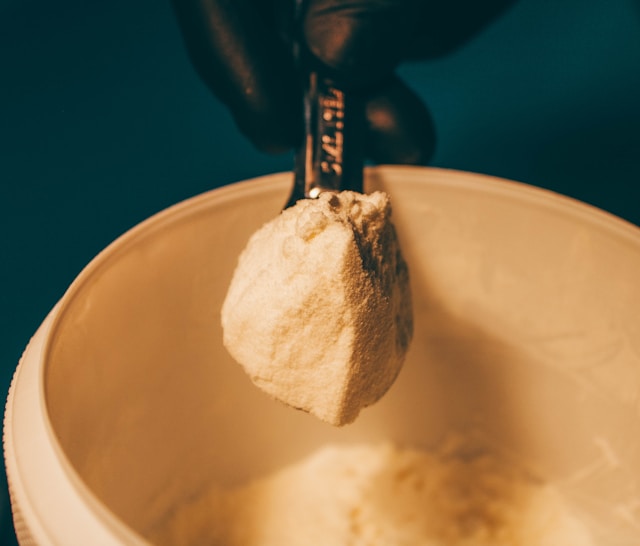Organic protein powder is a nutritional supplement that can be mixed with water, milk or smoothies to add protein and other essential nutrients. Flavor and texture options vary by product.

Organic options range from plant-based foods and drinks, while others rely on whey, which is produced without pesticides, helping decrease exposure to hormones and antibiotics in humans.
Nutritional Benefits
When looking for organic protein powder, it is essential to read and follow all labels. There are various options available and some contain sweeteners which could aggravate anyone with sensitivities to sugar or artificial sweeteners; too much consumption of such sweeteners could result in headaches, dizziness or emotional changes depending on which ones were chosen – this is why many who take dietary supplements opt for organic options so as to minimize potential negative side effects.
Organic protein powders offer more than just the added health benefit of forgoing certain chemical additives; they also offer a nutritious blend of ingredients designed to promote muscle growth and development alongside a balanced diet. Furthermore, their production reduces chemical use during production processes which has less of an impact on the environment.
Organic protein powders typically include both plant-based and animal proteins; for those with milk allergies or sensitivities, plant-based options provide more nutritional value while being better for the environment. Some brands even offer additional add-ins like chia seeds and xanthan gum to give thicker textures.
Selecting a flavored organic protein powder is an excellent way to add more flavor and variety to their shakes and smoothies, but remembering to consume in moderation. Some organic protein powders also feature natural sweeteners which may be suitable for diabetic and ketogenic lifestyles.
When selecting a flavored organic protein powder, it’s essential that the ingredients meet both quality standards and your dietary preferences. One such flavored organic protein powder option is Orgain chocolate coconut which has only 1 gram of sugar per serving with no artificial flavors or sweeteners added, mixing well in water or smoothies while being suitable for people who are dairy intolerant.
Choose organic protein powder if you suffer from dairy allergies or sensitivities; the product is gluten and soy free and provides an abundant supply of amino acids as well as many essential vitamins and minerals.
Safety
Protein powder is an easily-digested source of additional protein in our diets or for post-workout recovery after strength training workouts, offering both additional nutrition and muscle repair support. Most often sold as powder to be mixed with liquid, it may include both plant-based (hemp, peas, beans) or animal-based proteins such as whey casein collagen proteins – opt for organic options for reduced exposure to these additives!
Not all protein powders are created equal. A study conducted in 2018 by Denver-based Clean Label Project and independent analytical chemistry laboratory Ellipse Analytics discovered that 40 percent of 134 protein powders tested contained elevated levels of heavy metals such as lead, arsenic, or mercury; organic powders had on average twice more lead content than non-organic options.
Findings were particularly alarming given many contaminated products were sold as organic. To make their findings public, researchers from The Clean Label Project took to the market and randomly purchased and tested protein powders made up of both plant- and animal-sourced components. Their website displays these findings along with a five-star rating system which rates each product individually by how contaminated it is relative to others tested in this test.
While the US Food and Drug Administration regulates dietary supplements, they only set minimal exposure standards for elemental contaminants like heavy metals. Based on The Clean Label Project’s research, some companies have decided to change their ingredient lists and remove potentially dangerous heavy metals from their products.
Consider GMO content when purchasing protein powder. Some consumers avoid these genetically modified foods due to concerns over their impact on human and environmental health, while others have specific allergies or intolerances that restrict what they eat. When searching for quality, safe, and healthy options, look for USDA organic seals to make your selection easy – this will reduce exposure to harmful chemicals further. When selecting protein powder products look for these seals; look out for any that do not include artificial preservatives and synthetic pesticides for the lowest exposure risks possible – these USDA certified organic seals provide assurances when shopping – this way all necessary steps will be taken when shopping!
Ingredients
Organic protein powder provides essential proteins and nutrients without synthetic additives, preservatives or artificial components. Organic products also do not contain harmful pesticides or herbicides that could harm our bodies further. Furthermore, the body more readily absorbs organic ingredients than non-organic ones.
Consumers looking for products should look for third-party testing and organic plant-based proteins of high quality, in addition to no GMOs (genetically modified organisms). In addition, sweeteners or artificial flavors that might aggravate digestive conditions should be avoided and carrageenan (a natural seaweed ingredient that causes intestinal inflammation) should not be present as this may also trigger digestive problems.
A top organic protein powder uses only natural, digestive-friendly ingredients such as peas, brown rice, chia seeds or legumes for maximum digestibility and muscle development and recovery. They provide a complete amino acid profile necessary for muscle recovery while their high fiber content keeps your stomach full for extended periods.
Plant-based organic protein powders can also be an ideal solution for those who are lactose intolerant or have food allergies, or prefer dairy-free whey protein powder that’s fortified with extra vitamins and minerals to meet nutritional needs.
Note that organic protein powders should only be taken as supplements, not meal replacements. For maximum effectiveness, pair with a healthy diet to see best results. Incorporating high-quality organic whey or plant-based proteins provides ample amino acids – essential building blocks of muscles and other tissues throughout your body – into your regimen for maximum benefit.
Before organic products can be labeled, they must undergo stringent tests that include soil-to-seed inspections to ensure all plants grow in similar environments without contamination from synthetic fertilizers, herbicides or insecticides. Furthermore, organic milk must come from cows fed solely organic feed; conventional or non-organic foods do not meet such rigorous standards and often contain synthetic fertilizers, herbicides and insecticides among other chemicals that harm their production process.
Cost
Protein is an essential nutrient to support a healthy immune system, build lean muscle mass and more. Unfortunately, however, finding enough of it may be difficult if your schedule is full of commitments or you eat processed food diet. One solution could be using an organic protein powder which meets daily protein goals while cutting calories and sugar intake and supporting local farms at the same time!
When choosing an organic protein powder, the key considerations include nutritional value and ingredients analysis. Be sure to pick a product with at least 20 grams per serving of protein (and no artificial sweeteners or added sugar). Other key aspects are flavor profile and solubility of powder in liquid.
Organic protein powders that provide optimal results typically feature plant-based ingredients like pea, brown rice and chia seed proteins; they must also be free from GMOs and certified as organic by USDA or Ecocert. Organic options may also help individuals avoid dairy, soy and gluten products.
As well as considering nutritional facts, it’s also crucial to ensure a protein powder is safe to take and does not interact with medications you are already taking. Some whey-based proteins may interfere with how quickly certain antibiotics are absorbed; in contrast, organic plant-based powders tend to be well tolerated and don’t interact negatively with medication at all.
Consider whether or not the protein powder you choose contains prebiotics and probiotics – additional ingredients that support healthy gut and digestive function – which can be found in many organic protein powders, particularly those made with fermented ingredients such as kefir grains or apple cider vinegar.
If you’re uncertain whether organic protein powder is right for you, speaking to a registered dietitian nutritionist may help provide clarity. They will offer insight into the nutritional benefits and recommended dosage of each kind of powder as well as assistance finding one to meet both your specific needs and budget requirements.
organic protein powder – Click Here , Barilla Protein Pasta – Click Here

